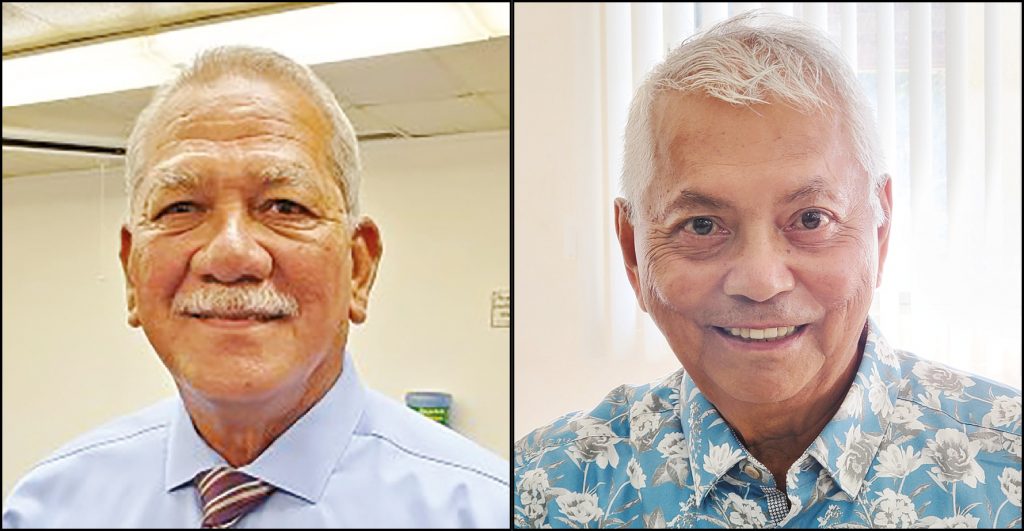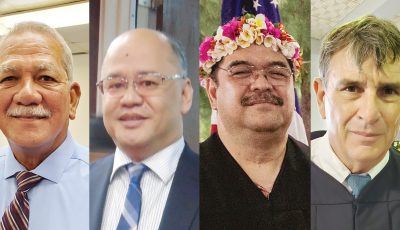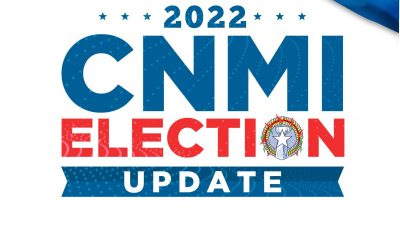FOR GOVT LAWYERS TO PRACTICE LAW SANS BAR EXAM
Proposal to hike requirement to 8 years gets AG, Lizama support
CNMI Attorney General Edward E. Manibusan and former Superior Court associate judge Juan T. Lizama both are in support of the CNMI Supreme Court’s interim proposed rule that seeks to increase from four years to a maximum of eight years the time allowed for recruited government lawyers to practice in the Commonwealth without requiring them to pass the NMI Bar examination.
Manibusan and Lizama expressed their opinion about the high court’s interim proposed rule in their testimony before the House of Representatives Judiciary and Governmental Operations Committee chaired by Rep. Celina R. Babauta (D-Saipan) that conducted a public hearing on the proposed rule and other legislations at the Pedro P. Tenorio Multi-Purpose Center in Susupe Thursday night.
Manibusan is seeking re-election for the AG position in the Nov. 8 general elections. Lizama is also a candidate for the position.
CNMI Supreme Court Chief Justice Alexandro C. Castro informed the Legislature early last month that their proposed Rule 73-2 of Title 9, Rules of Admission, provides for one four-year extension.
Castro said the proposed Rule 73-2 becomes effective 60 days after the submission, unless disapproved by a majority of the members of either Senate or House.
Manibusan said the proposed Rule 73-2 amends the rules of admission to permit a one-time extension of the limited government attorney license to allow them to represent the commonwealth government, or Micronesian Legal Services Corp., for up to eight years without getting the NMI Bar examination.
The AG said the interim rule also requires all attorneys admitted to practice pursuant to Rule 73-2 participate in Judiciary Committee community outreach program.
“In my capacity as the chief legal officer of the commonwealth government responsible for providing legal advice to the governor and all executive departments, representing the Commonwealth in all legal matters, and prosecuting violations of commonwealth law, I fully support the interim rule,” Manibusan said.
He said recruitment and retention for government attorneys are a challenge for the Commonwealth and that it is exacerbated by the four-year limitation.
Manibusan said having served nearly seven and a half years now as AG he finds that many government attorneys provide the Bar examination requirements as the primary reason for not renewing the contract of employment.
Manibusan said other attorneys leave because they have not invested in forming a strong and permanent community within the Commonwealth largely because the Bar examination requirements set an initial expectation that their time on island would be temporary.
He said the turnover of attorneys with four years of experience practicing in the Commonwealth after gaining familiarity with the customs and culture of the people and agencies and expertise with Commonwealth laws results in significant expense to the Commonwealth.
Manibusan noted that the costs of hiring a new attorney to replace one, who is currently employed by the CNMI government entity, is no less than $14,000.
He said this amount does not include the time and expense of training new attorney in Commonwealth practice and substantive law.
He said in order to be granted limited admission pursuant to Rule 73-2, the attorney applicant must be licensed to practice in an ABA approved jurisdiction.
Manibusan said government attorneys granted limited admission cannot work in private practice without gettingthe CNMI Bar so they do not represent any competition to locally hired attorneys for non governmental clients.
The AG said in addition, even without passing the CNMI Bar, these attorneys have more knowledge of Commonwealth laws and provide more experienced and knowledgeable service to the Commonwealth than a new off-island hire.
He said to qualify for an extension the applicant must continue to meet all requirements for limited admission, including maintaining good standing in every jurisdiction in which the attorney is admitted.
Manibusan said in the interest in enhancing the CNMI government ability to recruit and retain experienced attorney, government attorneys to serve the Commonwealth, and reduce government expense and reduce the expenses associated with new hiring from off island, he urged the JGO Committee to approve the interim proposed rule.
Lizama said he himself believe that it is very difficult task to recruit attorneys to the islands. Lizama said the observations that he found over the years is that most of them anyway, stay in the government.
“So it really doesn’t affect much the private sector. But it denies of course for them to try and take the Bar just for the show, perhaps maybe,” he said.
Lizama said there is no impediment for trying to pass the Bar. He said if an attorney comes in and works for the government, be in the Office of the Attorney General or in any of the branches of the government, the prerogative or the discretion of the supervisor of that attorney remains the same.
“So there’s really no impediment to not approve this proposed rule of admission,” said the former judge.




























